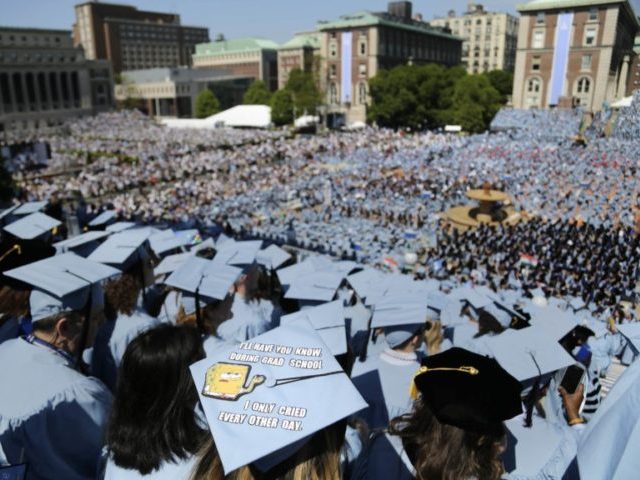Twenty-two Republican governors, led by Iowa Gov. Kim Reynolds, issued a letter slamming President Joe Biden’s student loan “forgiveness” scheme, which would cancel up to $20,000 in student loans and cost taxpayers an average of more than $2,500 per year, according to the National Taxpayers Union Foundation.
“We support making higher education more affordable and accessible for students in our states, but we fundamentally oppose your plan to force American taxpayers to pay off the student loan debt of an elite few,” the Republican governors stated.
The group noted that people in their states “cannot afford” the overall price tag of Biden’s “forgiveness” scheme.
Breitbart News reported on Monday that the National Taxpayers Union Foundation estimated that the scheme would cost between $386 billion and $405 billion in net costs to taxpayers, which works to cost the American taxpayers an average of $2,503.22.
Additionally, the Committee for a Responsible Federal Budget estimated that the Biden plan could cost around $500 billion, and the libertarian Cato Institute estimated that it would cost taxpayers $427 billion.
The group also noted that only 16 to 17 percent of Americans have federal student loan debt, but Biden’s scheme would be distributed and paid by the vast majority of taxpayers. “Shifting the burden of debt from the wealthy to working Americans has a regressive impact that harms lower income families.” they wrote.
The Republicans explained:
Borrowers with the most debt, such as $50,000 or more, almost exclusively have graduate degrees, meaning hourly workers will pay off the master’s and doctorate degrees of high salaried lawyers, doctors, and professors. What’s more, the top 20 percent of earning households hold $3 in student debt for every $1 held by the bottom quintile, generating a lopsided reality where the wealthy benefit at the expense of the working. Simply put, your plan rewards the rich and punishes the poor.
College may not be the right decision for every American, but for the students who took out loans, it was their decision: able adults and willing borrowers who knowingly agreed to the terms of the loan and consented to taking on debt in exchange for taking classes. A high-cost degree is not the key to unlocking the American Dream—hard work and personal responsibility is. For many borrowers, they worked hard, made sacrifices, and paid off their debt. For many others, they chose hard work and a paycheck rather than more school and a loan. Americans who did not choose to take out student loans themselves should certainly not be forced to pay for the student loans of others.
Furthermore, the Republicans noted that Biden announced his scheme while the country had been dealing with inflation because of the Democrats’ “unprecedented tax-and-spend agenda” and that his plan would “encourage more student borrowing, incentivize higher tuition rates, and drive-up inflation even further,” which would all “negatively” impact Americans.
The Republicans also point to the “bipartisan opposition” that the scheme has faced:
Even economists from your own party oppose your plan for raising demand and increasing inflation. Rather than addressing the rising cost of tuition for higher education or working to lower interest rates for student loans, your plan kicks the can down the road and makes today’s problems worse for tomorrow’s students.
Bipartisan opposition to your plan includes more than economic objections but process problems as well. As president, you lack the authority to wield unilateral action to usher in a sweeping student loan cancellation plan, a position shared by leaders of your party. Last year, Speaker of the House Nancy Pelosi (D-CA) stated, “People think that the President of the United States has the power for debt forgiveness. He does not. He can postpone, he can delay, but he does not have that power. That has to be an act of Congress.”
The governors were likely referring to Democrat economists Larry Summers and Jason Furman — who served under previous Democrat presidents — ripping Biden’s plan last month.
In a series of tweets in August, Summers — treasury secretary under Bill Clinton and director of the National Economic Council under Barack Obama — said, “Student loan debt relief is spending that raises demand and increases inflation. … It will also tend to be inflationary by raising tuitions.”
Additionally, Furman — a former economic adviser to Obama and Bill Clinton during their presidencies — also said in a series of social media posts, “Pouring roughly half-a-trillion dollars of gasoline on the inflationary fire that is already burning is reckless.”
“Most importantly, everyone else will pay for this either in the form of higher inflation or in higher taxes or lower benefits in the future,” Furman added.
The other governors besides Reynolds who signed the letter were: Kay Ivey (AL), Mike Dunleavy (AK), Doug Ducey (AZ), Asa Hutchinson (AR), Ron DeSantis (FL), Brian Kemp (GA), Brad Little (ID), Larry Hogan (MD), Mike Parson (MO), Greg Gianforte (MT), Pete Ricketts (NE), Chris Sununu (NH), Doug Burgum (ND), Mike DeWine (OH), Kevin Stitt (OK), Henry McMaster (SC), Kristi Noem (SD), Bill Lee (TN), Greg Abbott (TX), Spencer Cox (UT), and Mark Gordon (WY).
Jacob Bliss is a reporter for Breitbart News. Write to him at jbliss@breitbart.com or follow him on Twitter @JacobMBliss.

COMMENTS
Please let us know if you're having issues with commenting.